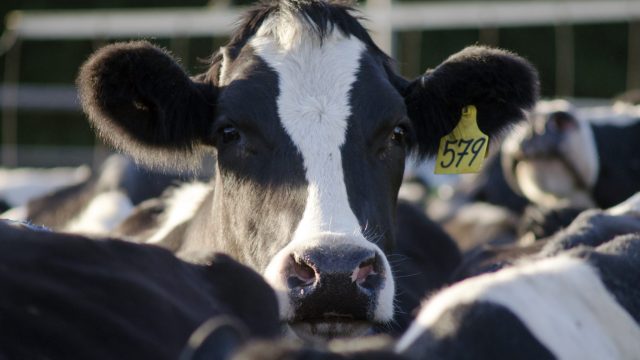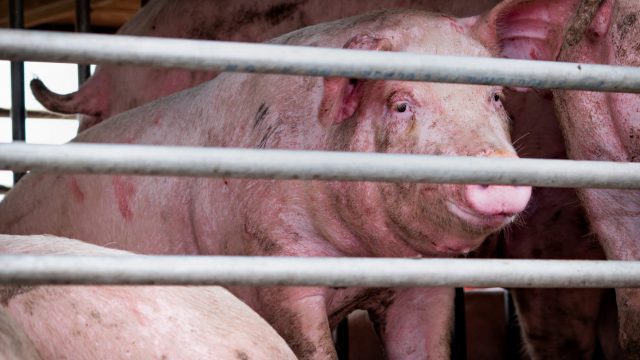
Q&A with an Animal Legal Defense Fund Attorney about Pursuing a Career in Animal Law
Animal Legal Defense Fund
Attorney Matthew Liebman recently answered a few questions for the Brandeis University Law Journal about the Animal Legal Defense Fund and working in animal law. In this interview, Matthew offers some insights for students who are interested in pursuing careers in this field.
Q: How did you get involved in animal protection law?
A: I’ve always had affection for animals, but my real interest in animal issues started in high school when I got a little parrot named Chaplin as a pet. (I have since learned the horrors of the pet trade and would never again purchase an animal from a pet store.) My relationship with Chaplin was pretty formative, and it really opened my eyes to the complexity and individual personality of each animal. I remember realizing one day how strange it was to have so much compassion for this bird while I ate other birds! So I became a vegetarian in high school in 1995. When I got to college, I read Peter Singer’s book Animal Liberation, which got me thinking about animal issues in a deeper and more philosophical way. I majored in philosophy and wrote my thesis on animal ethics through a postmodernist lens. I considered pursuing a PhD in philosophy with a continuing focus on philosophies of animality, but I decided I could probably do more good for animals as an attorney. So I went to Stanford Law School and became involved with the Animal Legal Defense Fund. After I graduated, the Fund offered me a position, which I jumped on.
Q: How can students become most effectively involved in animal welfare? Do you have any advice for those interested in studying animal protection law?
A: Students can become active by educating their peers on animal protection issues, volunteering with local animal rights groups or shelters, and attending protests and demonstrations. Law students in particular can join their schools’ [Animal Legal Defense Fund Student Chapters];. These groups find all kinds of creative ways to contribute to the animal law movement: getting their school to add an animal law course , inviting speakers to talk about various issues, screening films, raising money for local rescue organizations, and so on.
My advice to students interested in animal law is “Keep your options open.” Interest in animal law is growing much faster than the animal law job market. The unfortunate reality is that a lot of students who go to law school to practice animal law will not be able to find paying positions in the field when they graduate. So stay open to the possibility of practicing some other kind of law that may implicate animal protection indirectly: environmental law, family law, free speech law, criminal law. Or consider doing animal law as a pro bono side project. I certainly don’t want to discourage anyone from becoming an animal protection attorney, but I also don’t want people to have unrealistic expectations. I do think the field of animal law will continue to grow, even if not quite as quickly as the number of interested students.
Q: In my experience, people generally assume that being an animal lawyer is not a financially viable career path. As someone who is involved in this field, do you think there is an increasing career potential in animal protection law?
A: Like all public interest lawyers, animal protection lawyers don’t get the kind of salaries that those who work for large corporate firms get. I have classmates who make three times what I make. But obviously we’re not in it for the money, and we do make a living. Law students who are interested in public interest law should seriously consider attending a school with a strong loan repayment program. Law school is very expensive, and paying off your loans on a public interest salary is almost impossible without some kind of assistance. So ask your prospective law schools what kind of loan relief they offer to graduates who practice public interest law. I certainly couldn’t meet my loan payments if Stanford didn’t have a robust loan repayment assistance program.
Q: What do you feel are the biggest advancements made in animal law in recent years?
A: Probably the single biggest advance is the growth of animal law as a legitimate discipline within law schools. Every new idea faces the challenge of making itself heard, and I think we’ve come a long way in doing that for animal law. [The Animal Legal Defense Fund] has worked hard to support law students and law professors who are interested in its study and, as a result, the numbers of student chapters and animal law courses have grown drastically in the last decade. Animal law has become a respectable focus, and some of the most esteemed names in law have shown an interest in it: Richard Delgado, Alan Dershowitz, Angela Harris, William Kunstler, Martha Nussbaum, Richard Posner, Cass Sunstein, Larry Tribe. There are now several casebooks and law journals dedicated to animal law, marking it as a real field of academic inquiry.
On the litigation side of things, we’ve won some important cases. In [Animal Legal Defense Fund] v. Woodley, we used a little-known North Carolina law to rescue hundreds of dogs from a breeder and hoarder who kept the animals in unimaginably inhumane conditions. We’ve increased the amount of farmed animal cases we bring, drawing attention to the cruelties associated with the production of meat, eggs, and dairy products. On the legislation side, we’ve worked to strengthen animal cruelty laws nationwide, and heavily supported California’s Proposition 2, which will phase out some of the cruelest forms of intensive confinement for farmed animals.
Q: You are currently co-authoring a book on comparative and international animal law, an area that I once tried to research, and could find nearly nothing on. Do you think the efforts aimed at international animal protection are going to be a growing movement?
A: There is definitely an increasing interest in animal issues globally. A lot of animal protection advocates are realizing that corporate globalization makes it impossible for them to restrict their focus to their own locale. For example, the animal research industry has begun outsourcing projects to China, where animals are cheaper, regulations are lax, and animal rights activists are muzzled by authoritarian limits on protest. Networks are starting to develop between activists and attorneys around the world, so as the industries are globalizing, so too is the animal protection movement. And some of the most interesting and progressive policies are arising in places you wouldn’t expect: Bolivia recently banned the use of animals in circuses; the tiny European nation of San Marino banned all animal research; India banned the captivity of elephants in circuses and zoos; New Zealand essentially banned all research on great apes, and several other countries followed. These are exciting developments.
Q: Do you think the laws that currently exist provide enough leverage for lawyers to adequately pursue animal protection cases?
A: Existing animal laws are woefully inadequate. The federal Humane Methods of Livestock Slaughter Act, which is supposed to minimize suffering during slaughter, does not apply to birds, which make up ninety percent of the animals killed for food. The federal Animal Welfare Act, which is supposed to protect animals in laboratories, does not cover rats and mice, which make up ninety percent of the animals used in research. And most state animal cruelty laws exempt animals used in research and raised for food. So the laws we have cover only a tiny portion of the suffering humans inflict on animals. Large-scale industrial exploitation of animals is routine and, in most cases, completely legal.
That said, I do believe there are some favorable laws that provide opportunities to improve the lives of animals. Despite the shortcomings I just mentioned, [the Animal Legal Defense Fund] has litigated and won plenty of cases over the years in which we’ve saved hundreds and hundreds of animals from deplorable conditions. So there are certainly opportunities to use existing laws to help animals, but there is no question we need more of them.
The relationship between law and society is complicated, but generally, law follows social change; it rarely produces social change. So unless we have a grassroots movement that changes the prevailing cultural denigration of animal interests, we’re going to have a hard time winning significant legal victories. But the good news is that society is much further along that path than the existing laws might suggest: polls show that most people see their companion animals as family members, even though the law sees them as mere property. So the legal system is struggling to keep up with rapidly changing social attitudes toward animals. If we can continue to make social progress, I’m optimistic that legal progress will follow.
Reprinted with permission from the Brandeis University Law Journal. The Journal, one of the country’s few undergraduate legal research publications, featured this interview in its Spring 2010 issue.
How We Work
Related
-
Animal Legal Defense Fund Grant Supported Washington Attorney General’s Enforcement of Animal Cruelty Law
The judge sentenced a Snohomish County resident for killing then displaying neighborhood wildlife and shooting a kitten in the eye.April 18, 2024 News -
REPORT: 95 Percent of Consumers Prefer “Climate-Friendly” Products, But Labels Oversell Emission Reductions
New report reveals how misleading labels lead to increased confusion among consumers searching for more sustainable, less environmentally damaging products.April 2, 2024 Press Release -
Lawsuit Filed Demanding FDA Respond to Petitions Seeking to Ban Ractopamine
FDA’s approval for ractopamine relied primarily on safety studies conducted by the drugmaker.March 26, 2024 Press Release



